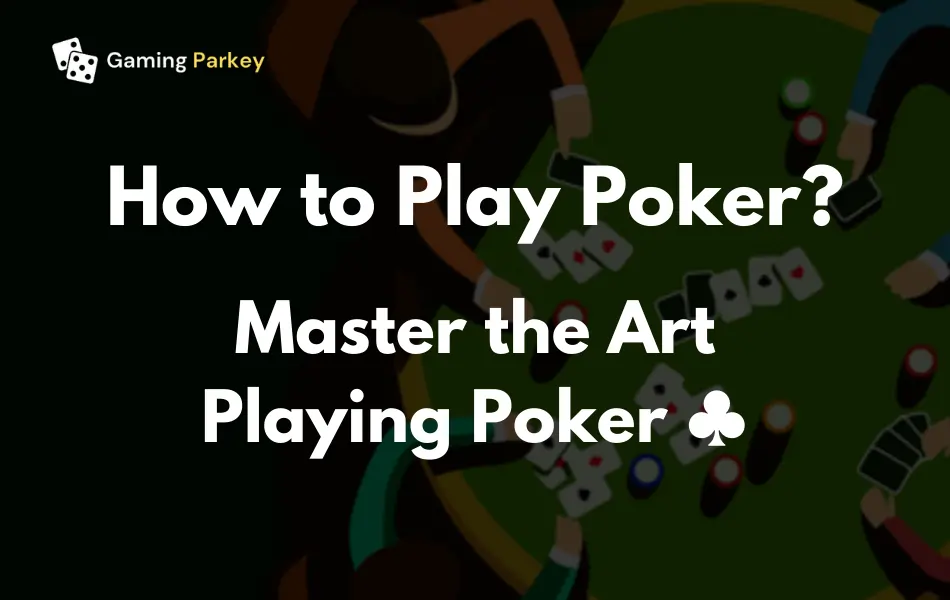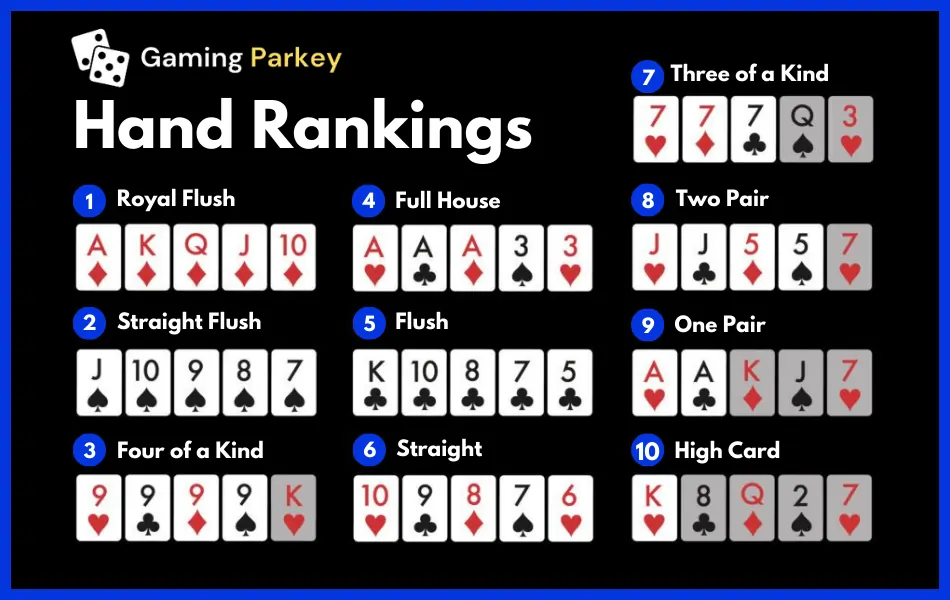The shuffling of cards, the clinking of chips, the thrill of the bluff – poker conjures images of high stakes games and seasoned pros. But strip away the mystique and poker is an accessible, exciting game that anyone can learn. This guide will teach you the basics, from understanding hand rankings to betting strategies, a complete and only guide you will need on How to Play Poker?
We'll cover the rules of popular variants like Texas Hold'em so you can join a game with confidence.
Whether you dream of outwitting your friends or making the final table, our beginner poker tips will start you on the road to becoming a winning player.
The cards are ready to be dealt – let's play some poker!

What is Poker?
Poker is a card game that involves a combination of skill, strategy, and luck. It is played with a standard deck of 52 cards and typically involves multiple players. The objective of the game varies depending on the specific variation being played, but the primary goal in most poker games is to have the best hand or to force opponents to fold their hands. For a more detailed explanation of what poker is, you can refer to our article on what is poker?.
Poker offers a variety of thrilling gameplay elements, including betting, bluffing, and reading opponents. These aspects make the game highly dynamic and unpredictable, requiring players to make calculated decisions based on the information available.
Popular Variations of Poker
Poker has numerous variations, each with its own set of rules and gameplay dynamics. Some of the most popular variations include:
| Variation | Description |
|---|---|
| Texas Hold'em | The most widely played poker variation, where players are dealt two private cards and must combine them with five community cards to form the best possible hand. To learn more about how to play Texas Hold'em, visit our article on how to play Texas Hold'em?. |
| Omaha | Similar to Texas Hold'em, but players are dealt four private cards instead of two. They must use exactly two of their private cards and three community cards to create their hand. |
| Seven-Card Stud | Each player is dealt a combination of face-down and face-up cards, with betting rounds in between. The player with the best five-card hand at the end of the final betting round wins. |
| Five-Card Draw | Players are dealt five private cards and have the opportunity to replace some or all of their cards in an attempt to improve their hand. The player with the best hand after the final betting round wins. |
| Caribbean Stud Poker | A casino-based variation where players compete against the dealer rather than each other. Players aim to have a better hand than the dealer to win. |
It's important to familiarize yourself with the specific rules and strategies of the variation you wish to play. Each variation has its own unique characteristics, and understanding the nuances will enhance your gameplay experience. For a comprehensive understanding of poker table rules and the different actions in poker, refer to our articles on poker table rules and action in poker respectively.
Now that you have an introduction to poker and an overview of some popular variations, let's delve deeper into the basic rules of poker in the next section.
Basic Rules on How to Play Poker
To master the art of playing poker, it's crucial to have a solid understanding of the basic rules. This section will cover two fundamental aspects of poker: hand rankings and betting rounds.

Hand Rankings
In poker, the objective is to form the best possible hand using a combination of your own cards and the community cards (in games like Texas Hold'em). The hand rankings determine the strength of your hand relative to other players.
Here are the standard hand rankings from highest to lowest:
| Hand Ranking | Description |
|---|---|
| Royal Flush | A, K, Q, J, 10 of the same suit |
| Straight Flush | Five consecutive cards of the same suit |
| Four of a Kind | Four cards of the same rank |
| Full House | Three cards of the same rank and a pair |
| Flush | Five cards of the same suit, not in consecutive order |
| Straight | Five consecutive cards of any suit |
| Three of a Kind | Three cards of the same rank |
| Two Pair | Two pairs of cards of the same rank |
| One Pair | Two cards of the same rank |
| High Card | The highest-ranking card in your hand |
It's important to note that in some variations of poker, such as Omaha and Stud, the hand rankings may vary slightly. Familiarize yourself with the specific rules of the game you're playing to ensure accurate hand evaluations. For more information on the rules of poker, check out our article on what is poker?.
Betting Rounds
In poker, betting rounds occur at various stages of the game and allow players to wager their chips based on the strength of their hand or their perceived advantage over other players. The most common types of betting rounds are pre-flop, flop, turn, and river.
The player with the best hand (or the last remaining player after all others have folded) wins the pot. Understanding the flow of the betting rounds is essential for making informed decisions and maximizing your chances of success at the poker table. To learn more about poker table rules and the various actions involved, visit our article on poker table rules.
By familiarizing yourself with hand rankings and betting rounds, you'll have a solid foundation to build upon as you delve deeper into the strategies and nuances of poker. As you gain experience, you'll discover that mastering the art of playing poker requires a combination of skill, intuition, and practice.
Mastering Poker Strategies
To become a skilled poker player, it's essential to master various strategies that can give you an edge at the poker table. This section will explore three important strategies: understanding odds and probabilities, reading your opponents, and bluffing and deception.
Understanding Odds and Probabilities
In poker, understanding odds and probabilities is crucial for making informed decisions. By calculating the odds of certain cards being dealt or the likelihood of certain hands winning, you can make strategic choices that maximize your chances of success.
One of the key concepts in poker is pot odds. Pot odds refer to the ratio of the current size of the pot to the cost of a contemplated call. By comparing the pot odds to the odds of completing your hand, you can determine whether it is worthwhile to continue in the hand or fold.
Another important concept is implied odds. Implied odds take into account the potential future bets you may win if you hit your hand. For example, if you have a drawing hand and believe you can extract additional chips from your opponents if you complete your draw, the implied odds may justify a call.
To further enhance your understanding of odds and probabilities in poker, studying and practicing with tools such as poker calculators can be beneficial. These calculators can help you calculate the odds of specific scenarios and make more informed decisions based on the probabilities involved.
Reading Your Opponents
Being able to read your opponents and interpret their actions is a valuable skill in poker. By observing their betting patterns, body language, and overall behavior, you can gain insights into the strength of their hands and make more accurate decisions.
Look for betting tells, which are patterns in your opponents' betting behavior that may indicate the strength or weakness of their hand. For example, sudden increases in bet sizes from a typically conservative player may signal a strong hand, while hesitations or quick calls may indicate uncertainty or a weaker hand.
Body language can also provide valuable information. Pay attention to your opponents' posture, facial expressions, and hand movements. These subtle cues can reveal nervousness, confidence, or even attempts at deception.
It's important to note that reading opponents requires practice and a keen sense of observation. Avoid relying solely on tells, as they can sometimes be misleading. Combining tell analysis with other information, such as the action on the poker table and the community cards, will help you make more accurate assessments of your opponents' hands.
Bluffing and Deception
Bluffing is an integral part of poker strategy. By strategically representing a stronger hand than you actually have, you can force your opponents to fold, even when they may have a better hand. However, bluffing should be used judiciously and in the right circumstances.
Successful bluffing requires an understanding of the players at your table and the overall dynamics of the game. Bluffing against observant and skilled opponents may be riskier, as they are more likely to pick up on your deception. On the other hand, bluffing against inexperienced or overly cautious players can be more effective.
To bluff effectively, you need to establish a consistent betting pattern that is believable. Mix in occasional bluffs with strong hands to keep your opponents guessing. Remember, successful bluffing is not about bluffing every time, but about choosing the right moments to deceive your opponents.
It's worth noting that bluffing can be a high-risk strategy, and it's important to be prepared for the possibility of being called. Understanding the balance between bluffing and playing solid hands is key to becoming a well-rounded poker player.
By mastering these strategies of understanding odds and probabilities, reading your opponents, and bluffing and deception, you can elevate your poker game to new heights. Remember, practice, study, and experience are essential in developing and refining these skills. Good luck at the tables!
Essential Skills for Poker Players
To truly master the art of playing poker, it's essential to develop certain skills that can enhance your gameplay and increase your chances of success. These skills go beyond the basic rules and strategies of the game. Let's explore three essential skills that every poker player should strive to cultivate: patience and discipline, bankroll management, and emotional control.
Patience and Discipline
Patience and discipline are qualities that can greatly influence your poker game. In poker, it's important to resist the urge to play every hand and instead wait for favorable situations. This requires patience and the ability to fold when necessary. Understanding the concept of positional play, hand strength, and the value of patience is crucial for long-term success.
By exercising discipline, you can avoid impulsive decisions and focus on making calculated moves. This means sticking to your strategy and not being swayed by short-term outcomes. Patience and discipline go hand in hand in poker, allowing you to make informed decisions based on the information available, rather than succumbing to emotions or external pressure.
Bankroll Management
Bankroll management is a fundamental skill that every poker player should prioritize. It involves effectively managing your poker funds to ensure longevity and sustainability in the game. Proper bankroll management helps minimize the risk of going broke and allows for continued play even during downswings.
A general rule of thumb is to allocate only a small portion of your overall bankroll to each individual game or tournament. This ensures that you have enough funds to withstand losses and take advantage of winning opportunities. By setting limits and adhering to a strict bankroll management plan, you can protect yourself from unnecessary financial risks.
| Bankroll Level | Recommended Buy-In Limit |
|---|---|
| Beginner | 1-2% |
| Intermediate | 2-5% |
| Advanced | 5-10% |
Remember, poker is a game of variance, and even the most skilled players can experience losing streaks. Effective bankroll management allows you to weather the inevitable ups and downs, ensuring that your poker journey is both enjoyable and sustainable. For more information on bankroll management strategies, check out our article on poker table rules.
Emotional Control
Emotional control is a vital skill in poker, especially during intense moments and when facing challenging opponents. Keeping your emotions in check allows you to think clearly and make rational decisions based on the information available. Emotional stability prevents you from making impulsive moves driven by frustration, anger, or excitement.
Maintaining composure at the poker table is crucial for accurately reading your opponents and making strategic moves. It's important to remember that poker is a game of skill and probabilities, and emotions can cloud your judgment. By staying emotionally detached from the outcomes of individual hands and focusing on long-term strategies, you can make more logical and profitable decisions.
Developing emotional control takes practice and self-awareness. Recognize and manage any tilt-inducing situations, and take breaks when needed to regain your focus. By cultivating emotional stability, you position yourself for success in the game of poker.
The essential skills of patience and discipline, bankroll management, and emotional control are key components of becoming a successful poker player. By honing these skills, you can improve your overall gameplay and enhance your chances of achieving long-term profitability. Remember, mastering poker is not just about the cards you hold, but also the skills and mindset you bring to the table.
Improving Your Poker Game
To truly master the art of playing poker, continual improvement is key. Enhancing your skills and knowledge in the game will give you a competitive edge. In this section, we will explore three essential aspects of improving your poker game: study and practice, analyzing your gameplay, and seeking expert advice and guidance.
Study and Practice
Studying and practicing are fundamental to improving your poker skills. Dedicate time to learning different strategies, studying hand rankings, and understanding the intricacies of the game. There are numerous resources available, such as books, online articles, and tutorials, that can provide valuable insights into poker theory and advanced tactics.
In addition to studying, practice is essential for honing your skills. Consider participating in low-stakes games or online poker rooms to gain practical experience. By playing regularly, you will develop a better understanding of the game dynamics, improve decision-making abilities, and refine your strategies. Remember to always play within your bankroll limits and adhere to responsible gambling practices.
Analyzing Your Gameplay
Analyzing your gameplay is crucial for identifying strengths, weaknesses, and areas for improvement. Keep a record of your poker sessions, noting key decisions, outcomes, and any patterns that emerge. This record will serve as a valuable reference point for self-assessment.
By reviewing your gameplay, you can identify any leaks in your strategy and work on rectifying them. Analyze hands where you had doubts or made suboptimal decisions. Consider seeking feedback from fellow players or joining poker forums to gain insights from experienced individuals. Additionally, use software tools or apps that offer hand analysis and tracking features to further enhance your analysis process.
Seeking Expert Advice and Guidance
Seeking expert advice and guidance can significantly accelerate your progress in poker. Engage with more experienced players, either through mentorship programs or by participating in poker communities. Their expertise and guidance can provide valuable insights, helping you refine your strategies and decision-making skills.
In addition, consider attending poker seminars, workshops, or webinars hosted by renowned poker professionals. These events offer opportunities to learn from the best in the field and gain a deeper understanding of advanced concepts and techniques. Internalizing their knowledge and incorporating their strategies into your gameplay can prove invaluable.
Remember that poker is a continuously evolving game, and staying updated with the latest trends and strategies is essential. Regularly read poker publications and follow reputable poker websites to stay informed about emerging strategies and industry developments. By constantly seeking to improve, you can elevate your poker game to new heights.
As you progress on your poker journey, remember that improvement requires a combination of dedication, discipline, and continuous learning. Embrace the challenge, be open to feedback, and persistently work on refining your skills. With time and effort, you can become a formidable player at the poker table.
Have You Learnt How to Play Poker?
As we move towards the end of this article, it is pretty clear that Poker is a game of skill, strategy, and a little bit of luck. Mastering the basics is the first step to becoming a winning player. Study the hand rankings, learn position and odds, and practice patience.
Stay focused, control your emotions, and respect the other players. While the cards you're dealt matter, how you play them makes all the difference. Poker rewards the thoughtful, the bold, and the lucky. With practice, anyone can succeed at the tables. The real reward is the fun of playing the game and matching wits against worthy opponents. Win or lose, savor the experience and the thrill of the cards.

![How to Play Mini Baccarat? From Novice to Pro [2025 Guide]](https://gamingparkey.com/wp-content/uploads/2023/09/Discover-How-to-Play-Mini-Baccarat--450x338.webp)












